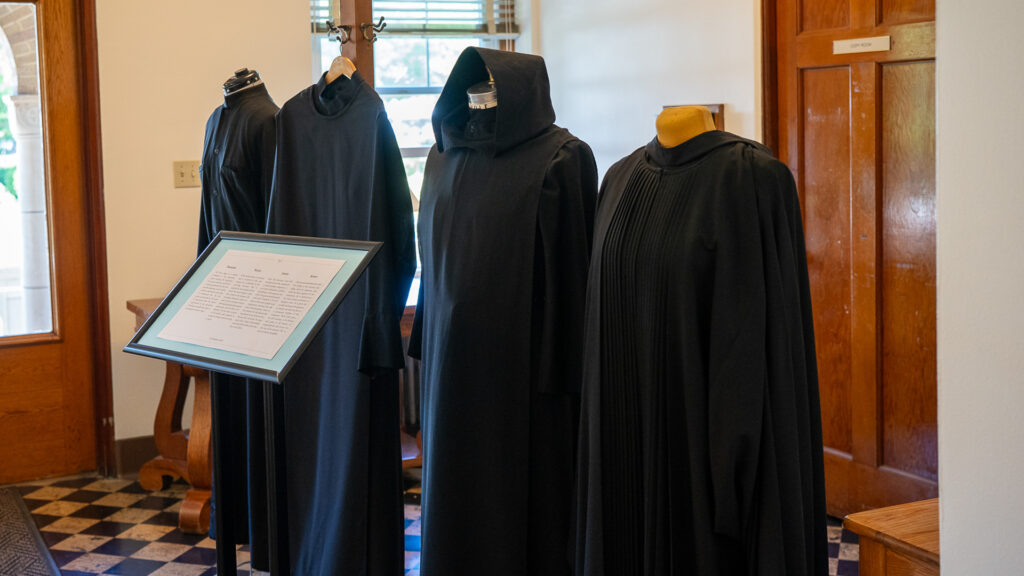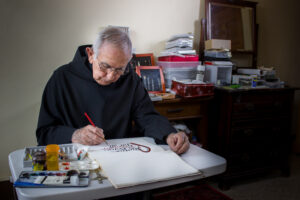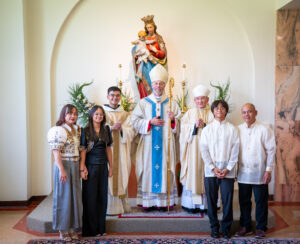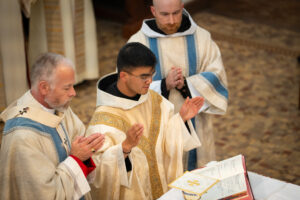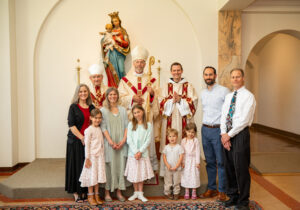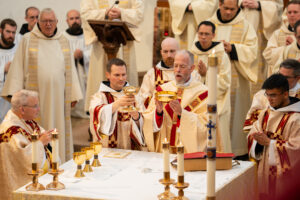By: Dr. Amanda Staggenborg
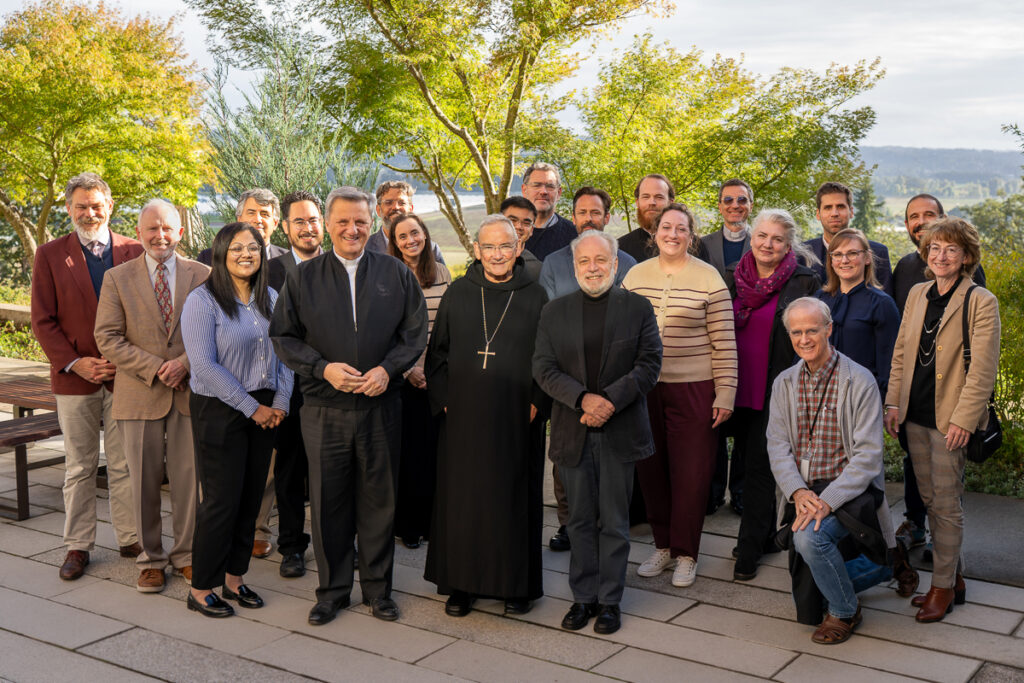
In a polarized world, the concept of “togetherness” is frequently discussed and at times, intensely debated. The “why” often conflicts with the “how.” At Mount Angel Abbey and Seminary, togetherness is more than merely a concept or discussion point but a way of life. From September 29 to October 3, Christian scholars from around the world gathered to think with “the mind of Christ,” (citing 1 Corinthians 2:16) sharing scholarly work that engages spiritual reflections for practical application. Faculty from Mount Angel Seminary joined with scholars from leading institutions, including Duke University, Boston College, Providence College, The Catholic University of America, the University of Exeter, and several others, to reflect on “Trinitarian Ontology,” exploring the centrality of the Eucharist and the Trinity as the source and form/shape of the Synodal Church, in an effort to enrich scholarly discussion but also applied in everyday life. The week-long workshop featured a Mass and remarks from Cardinal Mario Grech, Secretary General of the General Secretariat of the Synod at the Vatican, who participated in all of the Workshop’s discussions.
Created by Abbot Jeremy, Abbot of Mount Angel Abbey and Chancellor of Mount Angel Seminary, in discussions with Cardinal Grech and Monsignor Piero Coda, Secretary General of the International Theological Commission for the Vatican, the Workshop focused on five focal points: the Mystical Identity of the Church as communion, the decisive mystagogical significance of Christian initiation, the formation of the synodal Church in light of the Eucharist and Trinity, the practice of conversation in the Spirit, and the sacramental efficacy for the evangelization of the synodal Church. Enriching discussions and reflections about morality, symbolism, literature, and other topics offered the basis for reflection among the invited group, representing different theological disciplines. Each session began with a short theological contribution from one of the participants followed by a period of prayerful silence, allowing the participants to listen and think deeply before sharing their reflections on the topic.
“What’s in the middle is the Holy Spirit,” shared Abbot Jeremy, reflecting and quoting the third chapter of the Rule of St. Benedict guiding the spirit of the gathering. He stated that for this reason, Mount Angel Abbey and Seminary is the perfect space for deep, varied conversation:
“As often as anything important is to be done in the monastery, the abbot shall call the whole community together and himself explain what the business is; and after hearing the advice of the brothers, let him ponder it and follow what he judges the wiser course. The reason why we have said all should be called for counsel is that the Lord often reveals what is better to the younger. The brothers, for their part, are to express their opinions with all humility and not presume to defend their own views obstinately …. In the monastery no one is to follow his own heart’s desire.”
Holly Taylor Coolman from Providence College, expressed her enthusiasm for the Workshop, stating that “there is consistent interest in making sense of connections.”
Joy surrounded the conversations, with several stating how uplifted they were to participate in such a creative, rich model, necessary for current society. In lives rooted in the guidance of Christ’s teachings, one contributor proclaimed the originality of the event, categorizing the Workshop as a “cross between a retreat and academic conference.”
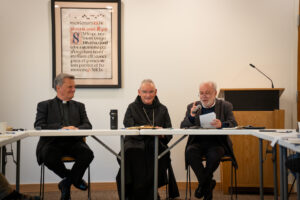 At the beginning of the Fellowship of Scholars, Cardinal Grech expressed his gratitude to Mount Angel Abbey and Seminary for “having chosen to dedicate this International Seminar to the theme of synodality in the life and vision of the Church,” calling this initiative both “precious and indeed necessary in the current phase of implementation of the 2021–2024 Synodal Process.” At the beginning of Mass for the Solemnity of the Archangels, Mount Angel Abbey’s patronal feast day and the first day of the Fellowship of Scholars, he described the Abbey as a true “spiritual oasis.” At the conclusion of the week, he shared his experience at the Abbey that, “the monks have so much to share, both from their reading and their own experiences. It is a place of beauty and beauty is a way that leads to God and it’s also a place of silence. Nowadays, we lack silence. But in silence, we can listen, really hear what the Spirit is trying to convey.”
At the beginning of the Fellowship of Scholars, Cardinal Grech expressed his gratitude to Mount Angel Abbey and Seminary for “having chosen to dedicate this International Seminar to the theme of synodality in the life and vision of the Church,” calling this initiative both “precious and indeed necessary in the current phase of implementation of the 2021–2024 Synodal Process.” At the beginning of Mass for the Solemnity of the Archangels, Mount Angel Abbey’s patronal feast day and the first day of the Fellowship of Scholars, he described the Abbey as a true “spiritual oasis.” At the conclusion of the week, he shared his experience at the Abbey that, “the monks have so much to share, both from their reading and their own experiences. It is a place of beauty and beauty is a way that leads to God and it’s also a place of silence. Nowadays, we lack silence. But in silence, we can listen, really hear what the Spirit is trying to convey.”
The Fellowship of Scholars, gathered in the Holy Spirit, is a prophetic sign to the Church and the world of God bringing together unity in diversity for the proclamation of the Gospel. As Cardinal Grech shared in his opening remarks, “the Church is the Temple of the Holy Spirit in which all those anointed by the Spirit at Baptism (and Confirmation) are enlightened by the Spirit of truth in order to contribute to the faithful reception of the Gospel in the various contexts of ongoing world history.”
As many currently feel a shifting of values, moral integrity and intellectual curiosity around the world, Christian scholars at Mount Angel Abbey and Seminary display, through their rich conversations and dedication to synodality, that the timeless example of Christ continues to guide and shape our lives.
Additional photos from the Fellowship of Scholars are available on Flickr.


 At the beginning of the Fellowship of Scholars, Cardinal Grech expressed his gratitude to Mount Angel Abbey and Seminary for “having chosen to dedicate this International Seminar to the theme of synodality in the life and vision of the Church,” calling this initiative both “precious and indeed necessary in the current phase of implementation of the 2021–2024 Synodal Process.” At the beginning of Mass for the Solemnity of the Archangels, Mount Angel Abbey’s patronal feast day and the first day of the Fellowship of Scholars, he described the Abbey as a true “spiritual oasis.” At the conclusion of the week, he shared his experience at the Abbey that, “the monks have so much to share, both from their reading and their own experiences. It is a place of beauty and beauty is a way that leads to God and it’s also a place of silence. Nowadays, we lack silence. But in silence, we can listen, really hear what the Spirit is trying to convey.”
At the beginning of the Fellowship of Scholars, Cardinal Grech expressed his gratitude to Mount Angel Abbey and Seminary for “having chosen to dedicate this International Seminar to the theme of synodality in the life and vision of the Church,” calling this initiative both “precious and indeed necessary in the current phase of implementation of the 2021–2024 Synodal Process.” At the beginning of Mass for the Solemnity of the Archangels, Mount Angel Abbey’s patronal feast day and the first day of the Fellowship of Scholars, he described the Abbey as a true “spiritual oasis.” At the conclusion of the week, he shared his experience at the Abbey that, “the monks have so much to share, both from their reading and their own experiences. It is a place of beauty and beauty is a way that leads to God and it’s also a place of silence. Nowadays, we lack silence. But in silence, we can listen, really hear what the Spirit is trying to convey.”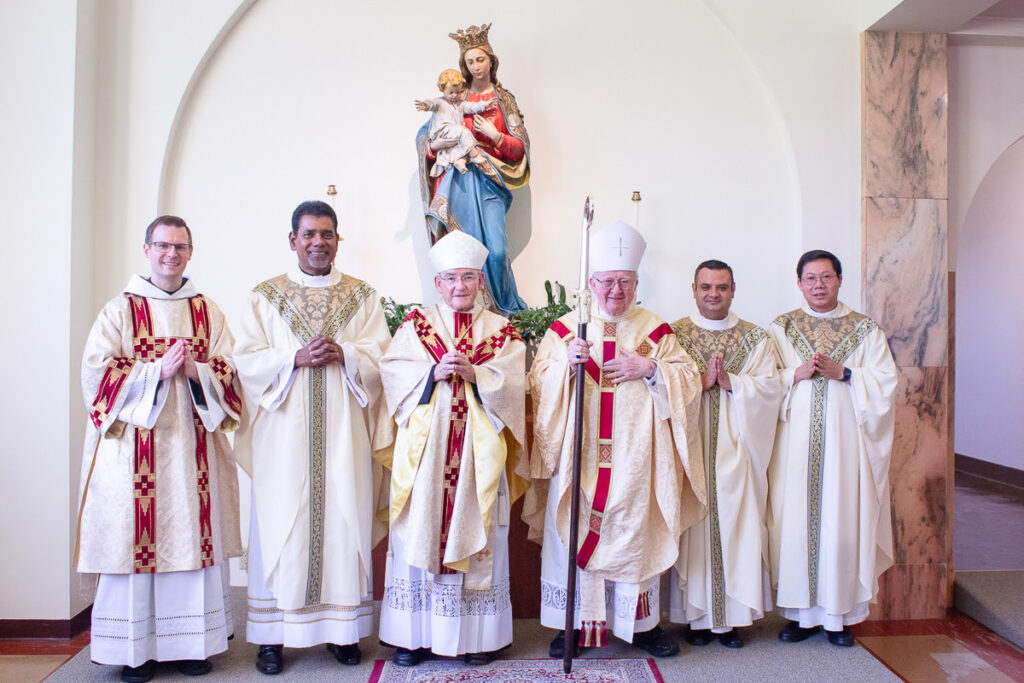 Bishop Kevin Vann, Bishop of the Diocese of Orange, celebrated his 20th anniversary of episcopal ordination with Abbot Jeremy Driscoll, OSB, and the monks of Mount Angel Abbey on July 13, 2025, with Mass in the Abbey church. He was the principal celebrant and homilist for the Mass, giving thanks to God and to the monks of Mount Angel for the support and friendship they have offered him as Bishop of Orange.
Bishop Kevin Vann, Bishop of the Diocese of Orange, celebrated his 20th anniversary of episcopal ordination with Abbot Jeremy Driscoll, OSB, and the monks of Mount Angel Abbey on July 13, 2025, with Mass in the Abbey church. He was the principal celebrant and homilist for the Mass, giving thanks to God and to the monks of Mount Angel for the support and friendship they have offered him as Bishop of Orange.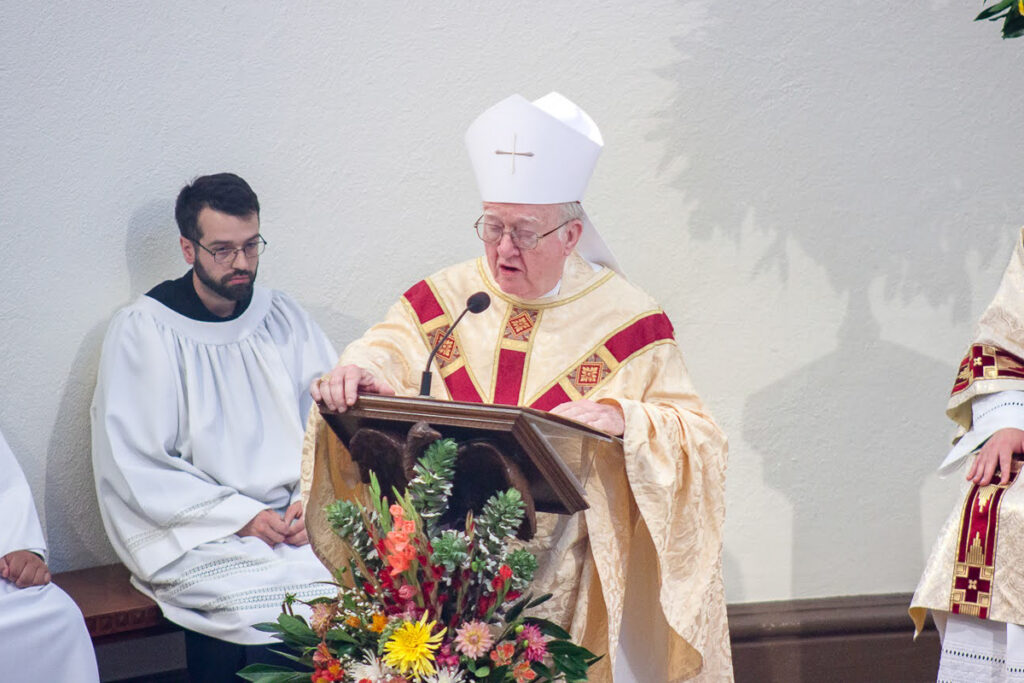 In his homily at Mount Angel for his 20th anniversary, Bishop Vann spoke about the Benedictine influence in his life from his seminary days forward. Addressing the monks, he said, “Most importantly, with all of you, as an oblate … I have found stability and family.” Bishop Vann made his final oblation as a Benedictine oblate of Mount Angel Abbey on July 26, 2024. He expressed his gratitude for the monks’ primary apostolate, Mount Angel Seminary, saying: “I am grateful, above all, to experience your solid formation and care for our seminarians, which is a blessing in a time when the number of our candidates is increasing significantly, and I’m grateful that we send you this year the ones we have.” Bishop Vann himself is an alumnus of Mount Angel Seminary, having earned his Doctor of Ministry on May 11, 2024.
In his homily at Mount Angel for his 20th anniversary, Bishop Vann spoke about the Benedictine influence in his life from his seminary days forward. Addressing the monks, he said, “Most importantly, with all of you, as an oblate … I have found stability and family.” Bishop Vann made his final oblation as a Benedictine oblate of Mount Angel Abbey on July 26, 2024. He expressed his gratitude for the monks’ primary apostolate, Mount Angel Seminary, saying: “I am grateful, above all, to experience your solid formation and care for our seminarians, which is a blessing in a time when the number of our candidates is increasing significantly, and I’m grateful that we send you this year the ones we have.” Bishop Vann himself is an alumnus of Mount Angel Seminary, having earned his Doctor of Ministry on May 11, 2024.